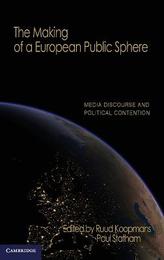
|
The Making of a European Public Sphere: Media Discourse and Political Contention
Hardback
Main Details
| Title |
The Making of a European Public Sphere: Media Discourse and Political Contention
|
| Authors and Contributors |
Edited by Ruud Koopmans
|
|
Edited by Paul Statham
|
| Series | Communication, Society and Politics |
|---|
| Physical Properties |
| Format:Hardback | | Pages:360 | | Dimensions(mm): Height 241,Width 162 |
|
| ISBN/Barcode |
9780521190909
|
| Classifications | Dewey:320.94 |
|---|
| Audience | | Professional & Vocational | |
|---|
| Illustrations |
47 Tables, unspecified; 21 Line drawings, unspecified
|
|
Publishing Details |
| Publisher |
Cambridge University Press
|
| Imprint |
Cambridge University Press
|
| Publication Date |
13 September 2010 |
| Publication Country |
United Kingdom
|
Description
This book investigates an important source of the European Union's recent legitimacy problems. It shows how European integration is debated in mass media, and how this affects democratic inclusiveness. Advancing integration implies a shift in power between governments, parliaments, and civil society. Behind debates over Europe's 'democratic deficit' is a deeper concern: whether democratic politics can perform effectively under conditions of Europeanization and globalization. This study is based on a wealth of unique data from seven European countries, combining newspaper content analyses, an innovative study of Internet communication structures, and hundreds of interviews with leading political and media representatives across Europe. It is by far the most far-reaching and empirically grounded study on the Europeanization of media discourse and political contention to date, and a must-read for anyone interested in how European integration changes democratic politics and why European integration has become increasingly contested.
Author Biography
Ruud Koopmans is Director of the Migration, Integration, and Transnationalization research unit at the Wissenschaftszentrum fur Sozialforschung Berlin and Professor of Sociology at the Vrije Universiteit Amsterdam. His research focuses on citizenship and immigration, European integration, social movements and collective action, and evolutionary sociology. He has authored and co-authored ten books, including Democracy from Below, New Social Movements in Western Europe, Challenging Immigration and Ethnic Relations Politics, and Contested Citizenship. He has published in leading journals such as the American Journal of Sociology, the American Sociological Review, the European Journal of Political Research, Evolution and Human Behavior, the Journal of Ethnic and Migration Studies, Mobilization, Social Problems, Theory and Society, and West European Politics. He is a member of the Scientific Advisory Councils of the Institute for German Studies and the Institute for Migration and Ethnic Studies, both in Amsterdam, and in 2004-2005 was an invited Fellow at the Center for Advanced Studies in the Behavioral Sciences at Stanford University. Paul Statham is Professor of Political Sociology and Director of EurPolCom, the International Research Network on European Political Communications, hosted by the Department of Sociology at the University of Bristol. He was formerly a Professor at the University of Leeds and a researcher at the Wissenschaftszentrum fur Sozialforschung, Berlin. His research focuses on European integration and the public sphere and on multiculturalism, Islam, and migrants' political mobilization in Europe, within a cross-national comparative framework. He has published more than 20 articles in international scholarly journals, including the American Journal of Sociology, Western European Politics, the Journal of Common Market Studies, the Harvard Journal of Press/Politics, the European Journal of Communication, Ethnicities, Journalism, Mobilization, and the European Political Science Review. He is co-author of Contested Citizenship: Immigration and Cultural Diversity in Europe with Ruud Koopmans, Marco Giugni, and Florence Passy. He also co-edited Challenging Immigration and Ethnic Relations Politics. His research program has been supported by six major grant awards from the European Framework Programme and two from the British Economic and Social Research Council.
Reviews"A democratic European Union, engaging citizens not just technocratic elites, requires a vibrant European public sphere to strengthen integration and legitimacy. Koopmans and Statham lead a first-rate team of international scholars to assess how far such an arena had emerged by the 1990s. Comparing newspaper and online coverage of European affairs in seven nations, supplemented with journalist interviews, the study concludes that the EU is publicly visible today on the policy issues where the EU is most influential, such as the euro. Koopmans and Statham present a highly original and theoretically-rich study providing novel insights into processes of political communications and European Union policymaking." -Pippa Norris, Harvard University "This is a book of major importance. It is hard to imagine how any future scholar addressing issues of Europeanization could possibly ignore it." -William Gamson, Boston College "European integration and European democracy are increasingly contested. Elites can no longer take public support for granted. The debates are taking in place in the mass media. This book documents in detail who raises which issues with whom and to whom in the European public sphere. It represents a giant leap forward in the study of the European public sphere by a group of top experts in the field. A must-read if you want to understand why the European Union and its policies are becoming ever more contentious." -Thomas Risse, Freie Universitat Berlin "A collectively written work rarely exhibits consistency in its conceptual framework or applies a common methodology. This rigorous argument for the existence of a 'Europeanized' public sphere, therefore, is surely an exception. Even better, as the European Union faces its present deep financial and political crisis, the authors' central thesis will be severely tested, providing grounds for future debate." -Philip Schlesinger, Centre for Cultural Policy Research, University of Glasgow
|